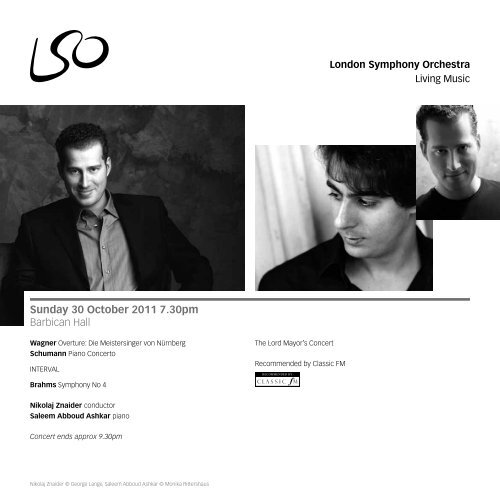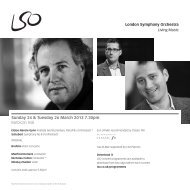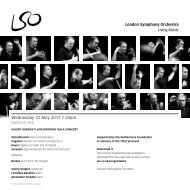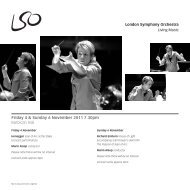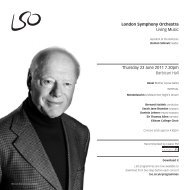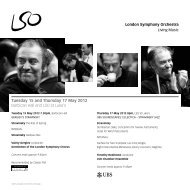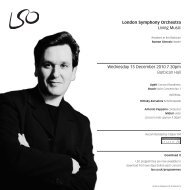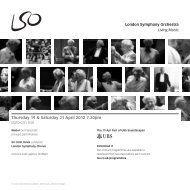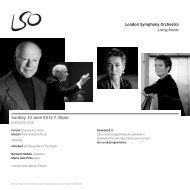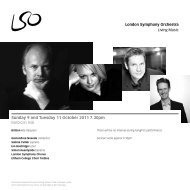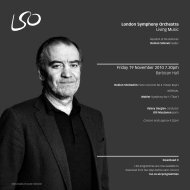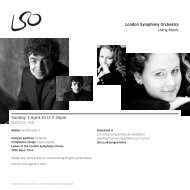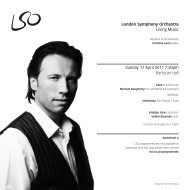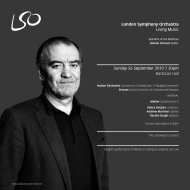Sunday 30 October 2011 - London Symphony Orchestra
Sunday 30 October 2011 - London Symphony Orchestra
Sunday 30 October 2011 - London Symphony Orchestra
Create successful ePaper yourself
Turn your PDF publications into a flip-book with our unique Google optimized e-Paper software.
<strong>Sunday</strong> <strong>30</strong> <strong>October</strong> <strong>2011</strong> 7.<strong>30</strong>pm<br />
Barbican Hall<br />
Wagner Overture: Die Meistersinger von Nürnberg<br />
Schumann Piano Concerto<br />
INteRvAL<br />
Brahms <strong>Symphony</strong> No 4<br />
Nikolaj Znaider conductor<br />
Saleem Abboud Ashkar piano<br />
Concert ends approx 9.<strong>30</strong>pm<br />
Nikolaj Znaider © George Lange, Saleem Abboud Ashkar © Monika Rittershaus<br />
the Lord Mayor’s Concert<br />
Recommended by Classic FM<br />
<strong>London</strong> <strong>Symphony</strong> <strong>Orchestra</strong><br />
Living Music
Welcome News<br />
Welcome to this evening’s concert at the Barbican. It is a delight<br />
to welcome Nikolaj Znaider to conduct the LSO for the first time in<br />
<strong>London</strong>, following a highly successful conducting debut with the<br />
<strong>Orchestra</strong> in Bucharest in September. He will be joined this evening<br />
by pianist Saleem Abboud Ashkar, also making his LSO debut.<br />
Nikolaj will join us again later this season, as soloist, to play<br />
Bartók’s violin Concerto No 2 on 8 May 2012.<br />
this evening, the LSO is joined by Lord Mayor, Alderman Michael<br />
Bear, and members of the Common Council of the City of <strong>London</strong><br />
Corporation. the LSO is deeply grateful for their continued support.<br />
I would also like to take the opportunity to thank our media partner<br />
Classic FM for continuing to be a strong advocate of the LSO.<br />
I hope you enjoy the concert and that you can join us for our<br />
next two performances which form part of a weekend-long<br />
celebration of French heroine Joan of Arc’s 600th birthday with<br />
conductor Marin Alsop.<br />
Kathryn McDowell<br />
LSO Managing Director<br />
LSO Backstage Pass – for our teenage audiences<br />
If you’re aged 12–18, join our free ‘LSO Backstage Pass’ teens<br />
scheme and take advantage of cheap tickets, pre-concert events<br />
and exclusive chances to meet the LSO players. Before tonight’s<br />
concert there was a free talk introducing this evening’s music and<br />
what it’s like to play in the <strong>Orchestra</strong>, plus a sneak peak backstage.<br />
Find out more at lso.co.uk/backstagepass<br />
The LSO’s <strong>2011</strong> New York tour<br />
earlier this month the <strong>Orchestra</strong> took up a week-long residency in<br />
New York’s Lincoln Center. Under the baton of Sir Colin Davis,<br />
Nikolaj Znaider performed Sibelius’ violin Concerto on 19 <strong>October</strong>,<br />
and on 21 <strong>October</strong> Sir Colin Davis led the <strong>Orchestra</strong> in Beethoven’s<br />
Missa Solemnis with the <strong>London</strong> <strong>Symphony</strong> Chorus.<br />
Finally, on <strong>Sunday</strong> 23 <strong>October</strong>, Gianandrea Noseda conducted<br />
Britten’s War Requiem with soloists Ian Bostridge and Simon<br />
Keenlyside in the wake of rave reviews for their <strong>London</strong> performances<br />
at the Barbican. LSO Principal Flute Gareth Davies has been closely<br />
following the progress of the tour in his blog.<br />
lsoontour.wordpress.com<br />
Nikolaj Znaider and Sir Colin Davis in conversation<br />
at LSO St Luke’s, Monday 31 <strong>October</strong> 11am<br />
tomorrow morning at LSO St Luke’s, Nikolaj Znaider will be in<br />
conversation with his conducting mentor, Sir Colin Davis,<br />
sharing their experiences of working on stage as part of<br />
Centre for <strong>Orchestra</strong>.<br />
Watch live and submit your questions online at<br />
facebook.com/londonsymphonyorchestra<br />
2 Welcome & News Kathryn McDowell © Camilla Panufnik
Richard Wagner (1813–1883)<br />
Overture: Die Meistersinger von Nürnberg (1868)<br />
First performed in Munich in 1868, Die Meistersinger von Nürmberg<br />
is Wagner’s only mature comedy; it is also a vast and – dramatically<br />
and musically – a super-enriched work and indeed one of the longest<br />
operas ever composed. It was a success from the first, and continues<br />
to hold a regular place in the repertory, even if its association with<br />
German Nationalism at various points has besmirched its reputation.<br />
Despite that, in its wisdom and rich humanity of characterisation<br />
it can provide one of the most life-affirming experiences the<br />
theatre has to offer.<br />
Unusually for Wagner, the action takes place in a specific period<br />
and location: the German city of Nuremberg in the mid-16th century.<br />
there prospers the guild of Mastersingers, its members local artisans<br />
and merchants who create art – specifically songs – as a central<br />
activity of their lives and according to strict, time-honoured rules.<br />
Into this intensely traditional community bursts the unruly knight<br />
Walther von Stolzing, who wants to win the hand of eva as the<br />
prize in a forthcoming singing contest. Supported by the local<br />
cobbler-poet Hans Sachs (one of the opera’s genuine historical<br />
figures), but opposed by the pernickety town-clerk Beckmesser,<br />
in the final scene Walther is able to defeat his rival with his inspired<br />
‘Prize Song’ and thus claim his bride.<br />
Wagner first drafted the scenario in 1845, though it was not until<br />
Tristan und Isolde was finished that he began to set Act One to<br />
music in 1863; the whole opera was completed four years later.<br />
Yet, amazingly, so sure was he of its musical content that he had<br />
already composed the overture and conducted its premiere in 1862.<br />
Its main themes represent the Mastersingers and their cheeky young<br />
apprentices, as well as Walther’s ‘Prize Song’, with Wagner bringing<br />
them all together at the close in a stunning display of counterpoint.<br />
Programme Note © George Hall<br />
George Hall writes widely on classical music, including for<br />
The Guardian, BBC Music Magazine and Opera.<br />
Richard Wagner<br />
Composer Profile<br />
Richard Wagner was born on 22 May 1813 in Leipzig. His musical<br />
talent was encouraged at Leipzig’s Nicolaischule and through<br />
lessons with Christian Gottlieb Müller. In 1829 he completed his first<br />
instrumental compositions, enrolling briefly as a music student at<br />
Leipzig University two years later. Wagner married the actress Minna<br />
Planer in November 1836, the couple moving from Riga to Paris<br />
in 1839 to escape Wagner’s creditors and living there in extreme<br />
poverty. Here he completed Rienzi and created The Flying Dutchman.<br />
Rienzi proved a big success at its Dresden premiere in <strong>October</strong> 1842,<br />
establishing Wagner’s reputation.<br />
In the 1850s, he began composing his monumental cycle of four<br />
Nibelung operas, also completing his ground-breaking opera<br />
Tristan und Isolde. His financial difficulties were removed in 1864<br />
by the teenage King Ludwig II, a dedicated Wagnerite who<br />
commissioned Der Ring des Nibelungen. Wagner’s comic masterpiece,<br />
Die Meistersinger von Nürnberg was premiered on Ludwig’s<br />
command; the King later funded the building of a new theatre at<br />
Bayreuth for the sole performance of Wagner’s works.<br />
For the remaining years of his life, Wagner worked on establishing<br />
the Bayreuth Festival and composing Parsifal, written specifically for<br />
Bayreuth. He died in venice on 13 February 1883, suffering a heart<br />
attack after an impassioned row with his second wife, Cosima.<br />
According to Wagnerian legend, there has been more written about<br />
the composer than anybody other than Napoleon and Jesus Christ.<br />
Although the claim is inaccurate, it is typical of the myths that have<br />
become attached to Wagner’s life and works. the vast scale of his<br />
creative output, its revolutionary influence on the development of<br />
Western music and the controversial nature of many of his views<br />
ensured the development of strong, even fanatical, support both<br />
for and against Wagner.<br />
Programme Notes<br />
3
Robert Schumann (1810–1856)<br />
Piano Concerto in A minor Op 54 (1841–1845)<br />
1 Allegro affettuoso<br />
2 Intermezzo grazioso –<br />
3 Allegro vivace<br />
Saleem Abboud Ashkar piano<br />
One of the most impressive features of Schumann’s only Piano<br />
Concerto is its remarkable organic unity. So many ideas in this richly<br />
imaginative work stem in one way or another from the lovely first<br />
movement melody (wind, then solo piano) that follows the concerto’s<br />
arresting opening. So it comes as quite a surprise to discover that<br />
the concerto was actually written in two separate instalments, and<br />
at two very different times in Schumann’s life. the first movement<br />
was originally written as a self-sufficient Fantasie for Piano and<br />
<strong>Orchestra</strong> in 1841 – the year that also saw the composition of the<br />
First <strong>Symphony</strong>, the original version of the Fourth, and the orchestral<br />
Overture, Scherzo and Finale. Schumann’s long-thwarted marriage<br />
to the brilliant concert pianist Clara Wieck the previous year had<br />
released a torrent of creativity: the first years of their life together<br />
saw the production of some of his finest pieces, often composed<br />
at breathtaking speed.<br />
then, in 1844, after Schumann and Clara had returned from a<br />
concert tour of Russia, Schumann experienced a crippling mental<br />
breakdown, followed by a terrible plunge into depression. At the end<br />
of the year he and Clara moved to Dresden with their two children,<br />
where gradually Schumann’s spirits began to recover. For a long<br />
time Schumann was unable to compose, but by the end of 1845<br />
he completed his <strong>Symphony</strong> No 2, a work which bears powerful<br />
witness to his struggles to regain health and stability. And before he<br />
started the symphony, Schumann added two more movements to<br />
the Fantasie, thus creating his Piano Concerto. How long the ideas for<br />
these two movements had been incubating in his mind is impossible<br />
to say, but it is certain that the act of putting them to paper was a<br />
major step forward on his road to psychological recovery. the result<br />
was one of Schumann’s most daring and romantically delightful<br />
works. It is easy to single out innovatory elements: the piano’s striking,<br />
downward-plunging opening gesture – after a single incisive chord<br />
4 Programme Notes<br />
from the full orchestra – is unlike the beginning of any concerto<br />
before. It clearly left a strong impression on the Norwegian composer<br />
edvard Grieg, who began his famous Piano Concerto (also in A minor)<br />
with a strikingly similar gesture. And although Schumann’s first<br />
movement appears to be full of melodic ideas, most of these derive<br />
directly from the original wind-piano tune – so much so that the<br />
movement has been described as ’monothematic’ – also very unusual<br />
for an early 19th-century concerto.<br />
But it is the dream-like quality Schumann brings to this kind of<br />
intricate thematic development that is most original. the piano writing<br />
may be challenging, but the real challenge is to the player’s poetic<br />
imagination rather than his or her virtuosity. even the first movement’s<br />
solo cadenza is more like a meditation than a bravura display.<br />
In general the relationship between the piano and the orchestra<br />
is neither as one-sided nor as competitive as in most romantic<br />
concertos. tender intimacy is much more typical. A couple of years<br />
before he began the first movement, Schumann had written of his<br />
hope that a new kind of ’genius’ might soon emerge: one ’who will<br />
show us in a newer and more brilliant way how orchestra and piano<br />
may be combined, how the soloist, dominant at the keyboard, may<br />
unfold the wealth of his instrument and his art, while the orchestra,<br />
no longer a mere spectator, may interweave its manifold facets into<br />
the scene’. In the Piano Concerto he fulfilled his own prophecy.<br />
the chamber music-like intimacy continues through the gentle<br />
Intermezzo Schumann placed as the concerto’s second movement –<br />
and again the way in which one motif seems to unfold from another<br />
is achieved with great subtlety and ingenuity. Just before the end<br />
of the movement comes a wonderful inspiration. Clarinets and<br />
bassoons recall the seminal first phrase of the first movement’s<br />
original melody – first in the major key, then in the minor – while the<br />
piano adds magical liquid figurations (as though dreamily recalling the<br />
concerto’s arresting opening). then the finale launches suddenly into<br />
an exhilarating, seemingly unstoppable waltz momentum. It is hard<br />
to believe that the man who wrote this gloriously alive dance music<br />
was at the time emerging from chronic depression. the ending in<br />
particular sounds like an outpouring of the purest joy.
Robert Schumann<br />
Composer Profile<br />
the youngest son of a Saxon bookseller, Robert Schumann was<br />
encouraged by his father to study music. Soon after his tenth birthday<br />
in 1820, young Robert began taking piano lessons in his home town<br />
of Zwickau. Although Schumann enrolled as a law student at Leipzig<br />
University in 1828, music remained an overriding passion and he<br />
continued to study piano with Friedrich Wieck. the early death of<br />
his father and two of his three brothers influenced Schumann’s<br />
appreciation of the world’s suffering, intensified further by his<br />
readings of Romantic poets such as Novalis, Byron and Hölderlin<br />
and his own experiments as poet and playwright.<br />
Schumann composed a number of songs in his youth, but it was not<br />
until he fell in love with and became secretly engaged to the teenage<br />
Clara Wieck in September 1837 that he seriously began to exploit<br />
his song-writing gift. Besides welcoming the financial return that<br />
published lieder [songs] could deliver, Schumann was also able to<br />
preserve his intense feelings for Clara in the richly expressive medium<br />
of song. the personal nature of Schumann’s art even influenced his<br />
choice of certain themes, with the notes A – B – e – G – G enshrined<br />
as the theme of one set of piano variations in tribute to his friend<br />
Countess Meta von Abegg. Schumann also developed his skills as a<br />
composer of symphonies and concertos during his years in Leipzig.<br />
Four years after their marriage in September 1840, the Schumanns<br />
moved to Dresden where Robert completed his C major <strong>Symphony</strong>.<br />
In the early 1850s the composer’s health and mental state seriously<br />
declined, perhaps as a consequence of tertiary syphilis. In March<br />
1854 he decided to enter a sanatorium near Bonn, where he died<br />
two years later.<br />
Programme Note and Composer Profile © Stephen Johnson<br />
Stephen Johnson is author of Bruckner Remembered (Faber).<br />
He also contributes regularly to BBC Music Magazine, and broadcasts<br />
for BBC Radio 3 (Discovering Music), Radio 4 and the World Service.<br />
INteRvAL: 20 Minutes<br />
<strong>London</strong> <strong>Symphony</strong> <strong>Orchestra</strong><br />
Living Music<br />
<strong>London</strong> <strong>Symphony</strong> <strong>Orchestra</strong><br />
Season <strong>2011</strong>/12<br />
International Pianists<br />
Mitsuko Uchida<br />
Sun 4 & tue 6 Dec 7.<strong>30</strong>pm<br />
Beethoven<br />
Piano Concerto No 4<br />
6 Dec sponsored by Canon europe<br />
Recommended by Classic FM<br />
Sun 11 & tue 13 Dec 7.<strong>30</strong>pm<br />
Beethoven<br />
Piano Concerto No 5<br />
Nicolas Hodges<br />
Sun 15 Jan 7.<strong>30</strong>pm<br />
Thomas Adès<br />
In Seven Days for Piano &<br />
<strong>Orchestra</strong><br />
tickets £10 to £35<br />
Box Office<br />
020 7638 8891 (bkg fee)<br />
lso.co.uk (reduced bkg fee)<br />
Nelson Freire<br />
tue 24 Jan 7.<strong>30</strong>pm<br />
Debussy<br />
Fantasy for Piano & <strong>Orchestra</strong><br />
André Previn<br />
Mon 20 Feb 7.<strong>30</strong>pm<br />
Mozart, Previn &<br />
Mendelssohn Piano trios<br />
with Anne-Sophie Mutter and<br />
Daniel Müller-Schott<br />
Part of UBS Soundscapes<br />
Programme Notes<br />
5
Johannes Brahms (1833–97)<br />
<strong>Symphony</strong> No 4 in e minor Op 98 (1884–85)<br />
1 Allegro non troppo<br />
2 Andante moderato<br />
3 Allegro giocoso<br />
4 Allegro energico e passionato<br />
Brahms composed his last symphony during the summers of 1884<br />
and 1885, although as so often with his major works he had been<br />
turning over some of the ideas in his mind for many years. Instead<br />
of a premiere in vienna, where the first three symphonies had been<br />
introduced (in 1876, 77 and 83), he chose instead to entrust its first<br />
performance to the small orchestra at the Ducal court of Meiningen<br />
in Germany, where Hans von Bülow had been in charge since 1880<br />
and was soon to be succeeded by the young Richard Strauss. Brahms<br />
himself conducted the symphony’s premiere on 25 <strong>October</strong> 1885,<br />
then the orchestra took it on tour through Germany and Holland,<br />
with Brahms and von Bülow sharing the conducting.<br />
time has softened one aspect of this symphony. We have become<br />
used to music that is so much harsher on the ears that we are at<br />
first struck by its richness of sound, so warm and seductive, and<br />
by its passionate lyricism. It requires an effort of the imagination to<br />
appreciate the impression of austerity and even grittiness that it made<br />
120 years ago. even some of Brahms’ closest friends were dismayed.<br />
His biographer Max Kalbeck, after hearing a performance on two<br />
pianos, advised the composer to publish the finale separately and<br />
scrap the third movement altogether. elisabeth von Herzogenberg<br />
wrote, ‘It seems to me as though this particular work has been too<br />
carefully designed for inspection through a microscope, as though<br />
its charms were not open to just any music-lover, as though it<br />
were a tiny world for the clever and the initiated’. A more balanced<br />
appreciation came from the violinist Joseph Joachim, when in 1886<br />
he told the composer, ‘the thrilling tension of the whole work, the<br />
concentration of feeling, the wonderfully intertwined development<br />
of motifs, even more than the richness and beauty of individual<br />
details, appeal to me so much that I almost think the e minor is<br />
my favourite of the four symphonies’.<br />
6 Programme Notes<br />
At times it seems that the essence of Brahms is a constant struggle<br />
between tragic stoicism and romantic lyricism, and the Fourth<br />
<strong>Symphony</strong> is the most dramatic expression of this conflict. Brahms’<br />
mastery of classical forms creates an internal drama, his controlling<br />
intellect leading the listener from bar to bar with an accumulation<br />
of detail and incident that eventually build up to what is perhaps the<br />
most complete picture we have of the composer’s emotional world.<br />
the first movement’s theme, quietly spreading wider and wider, is in<br />
a continuous state of development from the very beginning, and the<br />
falling thirds which comprise it appear throughout the symphony in<br />
one form or another. the motivic web is in fact more dense than in<br />
the previous symphonies, though since the themes are so distinct<br />
and characterful these cross-references are rarely heard on the<br />
surface, but act as a current running through the entire score at a<br />
subliminal level. the horn calls and dark modal colouring of the slow<br />
movement are essential images of German Romanticism: to Richard<br />
Strauss the movement suggested ‘a funeral procession moving in<br />
silence across moonlit heights’. the third movement (the last to be<br />
composed, and therefore well calculated for its overall effect in the<br />
symphony) is a blaze of major-key energy, dispelling the shadows of<br />
the Andante and setting up high expectations for a finale that will<br />
crown the different areas that the symphony has so far explored.<br />
the first three movements all follow some form of sonata structure.<br />
For the finale, though, Brahms drew on the ancient form of the<br />
passacaglia, or variations on a repeated bass. As early as February<br />
1869 he had written of his fondness for this technique: ‘With a theme<br />
and variations it is really only the bass line which is important to me …<br />
If I use just the melody as the basis for variations, I find it hard to<br />
go beyond the witty or charming, though I may make something<br />
pretty, perhaps developing on a lovely idea. Over a given bass line,<br />
however, I can become truly innovative: I can create new melodies’.<br />
the passacaglia theme of the Fourth <strong>Symphony</strong> is derived (with<br />
alterations) from the final chorus of J S Bach’s Cantata BWv 150,<br />
‘Nach dir, Herr, verlanget mich’ (For thee, O Lord, I long), and Brahms<br />
must also have had in mind the extraordinary Chaconne which ends<br />
Bach’s Partita for Solo violin in D minor, which he had arranged for
piano left-hand in 1877. the use of such a repeating pattern means<br />
that there is none of the modulation from key to key which we<br />
expect in a symphonic finale. Instead, Brahms created a scheme<br />
of 32 variations which are firmly anchored in e minor, but display<br />
such ingenuity and variety that there is a sense of headlong forward<br />
movement right up to the final bars.<br />
Programme Note © Andrew Huth<br />
Andrew Huth is a musician, writer and translator who writes<br />
extensively on French, Russian and Eastern European music.<br />
Music’s better shared!<br />
there’s never been a better time to bring all your friends to an<br />
LSO concert. Groups of 10+ receive a 20% discount on all tickets,<br />
plus a host of additional benefits. Call the dedicated Group Booking<br />
Line on 020 7382 7211 visit lso.co.uk/groups or email<br />
groups@barbican.org.uk<br />
On <strong>Sunday</strong> <strong>30</strong> <strong>October</strong> we welcome the Enfield National Trust<br />
Association, Gerrards Cross Community Association,<br />
Kelvedon Hatch Village Society, Ruislip WCA Music Society<br />
and Witham Choral Society.<br />
Johannes Brahms<br />
Composer Profile<br />
Johannes Brahms was born in Hamburg, the son of an impecunious<br />
musician; his mother later opened a haberdashery business to help<br />
lift the family out of poverty. Showing early musical promise he<br />
became a pupil of the distinguished local pianist and composer<br />
eduard Marxsen and supplemented his parents’ meagre income<br />
by playing in the bars and brothels of Hamburg’s infamous red-light<br />
district. In 1853 Brahms presented himself to Robert Schumann in<br />
Düsseldorf, winning unqualified approval from the older composer.<br />
Brahms fell in love with Schumann’s wife, Clara, supporting her after<br />
her husband’s illness and death. the relationship did not develop as<br />
Brahms wished, and he returned to Hamburg; their close friendship,<br />
however, survived. In 1862 Brahms moved to vienna where he found<br />
fame as a conductor, pianist and composer. the Leipzig premiere<br />
of his German Requiem in 1869 proved a triumph, with subsequent<br />
performances establishing Brahms as one of the emerging German<br />
nation’s foremost composers. Following the long-delayed completion<br />
of his First <strong>Symphony</strong> in 1876, he composed in quick succession the<br />
majestic violin Concerto, the two piano Rhapsodies, Op 79, the First<br />
violin Sonata in G major and the Second <strong>Symphony</strong>. His subsequent<br />
association with the much-admired court orchestra in Meiningen<br />
allowed him freedom to experiment and de v el op new ideas, the<br />
relationship crowned by the Fourth <strong>Symphony</strong> of 1884.<br />
In his final years, Brahms composed a series of profound works<br />
for the clarinettist Richard Mühlfeld, and explored matters of life<br />
and death in his Four Serious Songs. He died at his modest lodgings<br />
in vienna in 1897, receiving a hero’s funeral at the city’s central<br />
cemetery three days later.<br />
Profile © Andrew Stewart<br />
Andrew Stewart is a freelance music journalist and writer.<br />
He is the author of The LSO at 90, and contributes to a wide<br />
variety of specialist classical music publications.<br />
Programme Notes<br />
7
Nikolaj Znaider<br />
Conductor<br />
‘A good conductor,<br />
and time might well turn<br />
him into a great one’<br />
the Guardian, March 2010<br />
Nikolaj Znaider is not only celebrated as one<br />
of the foremost violinists of today, but is fast<br />
becoming one of the most versatile artists of<br />
his generation uniting his talents as soloist,<br />
conductor and chamber musician.<br />
this season Nikolaj Znaider was invited by<br />
valery Gergiev to become Principal Guest<br />
Conductor of the Mariinsky <strong>Orchestra</strong> in<br />
St Petersburg where he will conduct a<br />
production of The Marriage of Figaro and<br />
a number of symphonic concerts. As well<br />
as the LSO, he has been invited to guest<br />
conduct the Royal Concertgebouw <strong>Orchestra</strong>,<br />
Munich Philharmonic, Czech Philharmonic,<br />
LA Philharmonic, Pittsburgh <strong>Symphony</strong>,<br />
Orchestre Philharmonique de Radio France,<br />
WDR Köln and already has re-invitations to<br />
conduct the Dresden Staatskapelle, Russian<br />
National <strong>Orchestra</strong>, the Hallé, Swedish<br />
Radio <strong>Orchestra</strong> and Gothenburg <strong>Symphony</strong>.<br />
the <strong>2011</strong>/12 season sees Znaider as Artistin-Residence<br />
with the Dresden Staatskapelle<br />
<strong>Orchestra</strong>. He will conduct them in concert,<br />
perform violin concertos with Sir Colin Davis<br />
and play a recital.<br />
As a soloist, Znaider is regularly invited to<br />
work with the world’s leading orchestras<br />
and conductors such as Daniel Barenboim,<br />
Sir Colin Davis, valery Gergiev, Lorin Maazel,<br />
Zubin Mehta, Christian thielemann, Mariss<br />
Jansons, Charles Dutoit, Christoph von<br />
Dohnányi, Ivan Fischer and Gustavo Dudamel.<br />
In recital and as a chamber musician he<br />
appears at all the major concert halls. In<br />
the 2008/9 season the LSO presented an<br />
Artist Portrait of Znaider and in the 2012/13<br />
season he will present a Carte Blanche at<br />
the Musikverein in vienna.<br />
An exclusive RCA Red Seal recording<br />
artist, Znaider’s most recent addition to his<br />
discography is the elgar violin Concerto with<br />
Sir Colin Davis and the Dresden Staatskapelle.<br />
His award-winning recordings of the Brahms<br />
and Korngold violin Concertos with the<br />
vienna Philharmonic and valery Gergiev, the<br />
Beethoven and Mendelssohn Concertos with<br />
Zubin Mehta and the Israel Philharmonic<br />
and Prokofiev’s Second and Glazunov violin<br />
Concertos with Mariss Jansons and the<br />
Bayerische Rundfunk have been greeted<br />
with great critical acclaim, as was his release<br />
of the complete works for violin and piano<br />
of Johannes Brahms with Yefim Bronfman.<br />
For eMI Classics he has recorded the Mozart<br />
Piano trios with Daniel Barenboim and<br />
the Nielsen and Bruch Concertos with the<br />
<strong>London</strong> Philharmonic <strong>Orchestra</strong>.<br />
Znaider is passionate about the education<br />
of musical talent and was for ten years<br />
Founder and Artistic Director of the Nordic<br />
Music Academy, an annual summer school<br />
whose vision it was to create conscious<br />
and focused musical development based<br />
on quality and commitment.<br />
8 The Artists Nikolaj Znaider © George Lange
Saleem Abboud Ashkar<br />
Piano<br />
‘Ashkar’s rubato lines almost<br />
melted on the ears.’<br />
New Zealand Herald, March <strong>2011</strong><br />
Saleem Abboud Ashkar made his New York<br />
Carnegie Hall debut at the age of 22 and<br />
has since worked with many of the world’s<br />
leading orchestras including the vienna<br />
Philharmonic, Israel Philharmonic, Chicago<br />
<strong>Symphony</strong>, La Scala Philharmonic, Leipzig<br />
Gewandhaus, Deutsche <strong>Symphony</strong> <strong>Orchestra</strong><br />
Berlin, Radio <strong>Symphony</strong> <strong>Orchestra</strong> Berlin,<br />
Maggio Musicale, New Zealand <strong>Symphony</strong><br />
<strong>Orchestra</strong>, Bergen Philharmonic, Mariinsky<br />
<strong>Orchestra</strong> and the <strong>Orchestra</strong> of the Royal<br />
Danish theatre.<br />
He performs regularly with conductors<br />
such as Zubin Mehta, Daniel Barenboim,<br />
Riccardo Muti, Lawrence Foster, Bertrand<br />
de Billy, Philippe Jordan and Ludovic Morlot,<br />
and following a highly successful debut with<br />
Christoph eschenbach and the NDR Hamburg<br />
<strong>Orchestra</strong>, with whom he was immediately<br />
re-invited to work, eschenbach invited Ashkar<br />
Saleem Abboud Ashkar © Monika Rittershaus<br />
to play the Schumann Piano Concerto with<br />
the Düsseldorf <strong>Symphony</strong> <strong>Orchestra</strong> in the<br />
Schumann Birthday Concert in June 2010.<br />
Ashkar has toured extensively with Riccardo<br />
Chailly and the Leipzig Gewandhaus<br />
<strong>Orchestra</strong> performing Mendelssohn’s First<br />
Piano Concerto, including appearances at<br />
the BBC Proms and Lucerne Festivals, in a<br />
tour celebrating the bicentennial anniversary<br />
of the composer’s birth, and Chailly has<br />
re-invited Saleem for concerts and to record<br />
with him for Decca in the 2012/13 season.<br />
Appearances in this and future seasons<br />
include invitations to make debuts with the<br />
Royal Concertgebouw <strong>Orchestra</strong> and the LSO<br />
playing concerts in <strong>London</strong> and Bucharest,<br />
WDR Köln, the Konzerthaus <strong>Orchestra</strong> Berlin,<br />
Danish National <strong>Symphony</strong> <strong>Orchestra</strong>,<br />
Royal Liverpool Philharmonic and National<br />
Arts Centre <strong>Orchestra</strong> Ottawa at the invitation<br />
of Pinchas Zukerman.<br />
A dedicated recitalist and chamber<br />
musician, Ashkar appears regularly in series<br />
at venues such as the Concertgebouw,<br />
Mozarteum Salzburg, Musikverein vienna,<br />
Conservatorio Guiseppe verdi in Milan and<br />
at festivals including Salzburg with the vienna<br />
Philharmonic, the BBC Proms with Leipzig<br />
Gewandhaus <strong>Orchestra</strong>, at tivoli with the<br />
Israel Philharmonic and Zubin Mehta, in<br />
Lucerne, Ravinia, Risor, Menton and the<br />
Ruhr Klavier Festival, collaborating with<br />
artists including Daniel Barenboim,<br />
Nikolaj Znaider and Waltraud Meier.<br />
BBC Radio 3 Lunchtime Concerts<br />
Thursdays at 1pm, LSO St Luke’s<br />
Beethoven Piano Sonatas<br />
A complete retrospective<br />
Thu 3 Nov 1pm<br />
Nicholas Angelich<br />
Sonatas Op 2 No 2, Op 31 No 1<br />
Thu 10 & 17 Nov 1pm<br />
elisabeth Leonskaja<br />
Sonatas Op 13 (‘Pathétique’),<br />
Op 14 No 1, Op 110, Op 49 No 2,<br />
Op 109, Op 111<br />
Thu 24 Nov 1pm<br />
Barry Douglas<br />
Sonatas Op 79,<br />
Op 106 (‘Hammerklavier’)<br />
Tickets £10<br />
lso.co.uk/lunchtimeconcerts<br />
020 7638 8891<br />
The Artists<br />
9
Nikolaj Znaider<br />
on conducting the LSO<br />
‘It is very much about<br />
all of us on stage sharing<br />
our passion for the music<br />
we are performing.’<br />
Nikolaj Znaider is not only celebrated as one of the<br />
foremost violinists of today, but is fast becoming<br />
one of the most versatile artists of his generation<br />
uniting his talents as soloist, chamber musician<br />
and most recently, as a conductor.<br />
Just before the <strong>London</strong> season started Nikolaj Znaider<br />
made his conducting debut with the LSO in Bucharest<br />
and preceding his Barbican concert with the LSO on<br />
<strong>30</strong> <strong>October</strong>, Isla Jeffrey caught up with Nikolaj to<br />
ask him about his experience as a conductor and<br />
plans for the future.<br />
10 Nikolaj Znaider Interview<br />
Was there any particular moment in your life or a particular<br />
piece of music that made you want to start conducting?<br />
there were several but the first instance was when I was studying<br />
the Beethoven symphonies, closely followed by attending a week’s<br />
rehearsals for The Marriage of Figaro.<br />
Do you have a favourite Beethoven symphony?<br />
No! I don’t believe in favourite anything. I wouldn’t want to be<br />
without any of them. Like people, good friends, you wouldn’t want<br />
to miss any one of them.<br />
What did your first professional conducting experience<br />
feel like?<br />
terrifying. Nothing can ever prepare you properly for it. You think you<br />
can look at it from afar and predict how it’s all going to go but you just<br />
can’t. As a violin soloist, I have been standing next to conductors –<br />
very close to them on the stage – for many years, and yet the feeling<br />
that your physical movements can impact in a very real way what<br />
comes out is a totally overwhelming experience. I remember after<br />
my first rehearsal being so exhausted, so overwhelmed that I went<br />
straight to bed. It must have been only 2pm and I didn’t get out of bed<br />
again until the rehearsal the next day!
Has your experience as a violin player influenced your<br />
conducting style or understanding of conducting in any way?<br />
I think it has to have. I would say that it has influenced the way I<br />
conduct. the ideal sound that I hear in my head, and that I try to<br />
recreate as a violinist, is the same in principle as when I hear my ideal<br />
orchestral sound. this way of listening has very much informed the<br />
way I conduct, and the way I listen to the orchestra’s sound.<br />
What would you say is the biggest performing difference<br />
between being a soloist and a conductor?<br />
As a violinist you are directly responsible for the sound, and as a<br />
conductor, indirectly responsible. Aside from that, and this is really<br />
the miraculous discovery I made, there is no difference. It is the<br />
same thing. It is all about sharing the delight in music with others,<br />
being aware of what the musicians with you on stage are doing;<br />
interacting with them and reacting to them. Yes, the function is<br />
different but it’s really all the same thing.<br />
You have described yourself as having ‘Mahleria’.<br />
Are there any other great composers or works you<br />
are looking forward to working on?<br />
Anything Mozart, anything Beethoven, anything that when you return<br />
to it remains our Holy Grail, the things that we can only hope to ever<br />
get near. there’s opera, and I’m looking forward to getting into that.<br />
Something coming up for me in the very near future are the Stravinsky<br />
ballets; they really fascinate me and I haven’t been able to do<br />
anything like that before. In the same way that Mahler didn’t write any<br />
violin concertos, so Mahler was a new performing experience for me,<br />
Stravinsky is something completely different that I can’t wait to sink<br />
my teeth into. Stravinsky did write a violin concerto but it was much<br />
later on and in a completely different style to the early ballets.<br />
Is there a conductor who has influenced or inspired<br />
you the most?<br />
A lot. I really think there is so much to learn if one just opens one’s<br />
eyes. Daniel Barenboim was a huge influence on helping me to think<br />
like a conductor and of course, the person who has meant the most<br />
to me on so many levels, humanly and musically is Sir Colin Davis.<br />
He means so much to me in so many ways. One of the things which<br />
makes my relationship with the LSO special is that we share that great<br />
relationship with Colin.<br />
What are you most looking forward to about your concert<br />
with the LSO on <strong>30</strong> <strong>October</strong>?<br />
Now that I have conducted them already, what I know about them<br />
is that they are all such generous musicians and a music-making<br />
experience with them is truly about love. It is very much about all<br />
of us on stage sharing our passion for the music we are performing.<br />
this <strong>Orchestra</strong> has so much to give, and that is what I am looking<br />
forward to most about being on stage with them.<br />
Coming up with Nikolaj Znaider<br />
Tue 8 May 7.<strong>30</strong>pm<br />
Bartók Music for Strings, Percussion and Celeste<br />
Bartók violin Concerto No 2<br />
Szymanowski <strong>Symphony</strong> No 3 (‘Song of the Night’)<br />
with Pierre Boulez conductor<br />
Tickets from £10<br />
Box Office 020 7638 8891 (bkg fee)<br />
lso.co.uk (reduced bkg fee)<br />
Nikolaj Znaider Interview<br />
11
On stage<br />
First Violins<br />
Carmine Lauri Leader<br />
Lennox Mackenzie<br />
Ginette Decuyper<br />
Jörg Hammann<br />
Maxine Kwok-Adams<br />
Claire Parfitt<br />
Colin Renwick<br />
Sylvain vasseur<br />
Rhys Watkins<br />
David Worswick<br />
Daniel Bhattacharya<br />
Sophie Mather<br />
Hilary Jane Parker<br />
Alina Petrenko<br />
erzsebet Racz<br />
Helena Smart<br />
Second Violins<br />
evgeny Grach<br />
thomas Norris<br />
Miya vaisanen<br />
David Ballesteros<br />
Belinda McFarlane<br />
Iwona Muszynska<br />
Philip Nolte<br />
Paul Robson<br />
Raja Halder<br />
William Melvin<br />
Katerina Mitchell<br />
Stephen Rowlinson<br />
Julia Rumley<br />
Samantha Wickramasinghe<br />
12 The <strong>Orchestra</strong><br />
Violas<br />
edward vanderspar<br />
Malcolm Johnston<br />
Regina Beukes<br />
German Clavijo<br />
Anna Green<br />
Richard Holttum<br />
Robert turner<br />
Jonathan Welch<br />
Melanie Martin<br />
Caroline O’Neill<br />
Fiona Opie<br />
Alistair Scahill<br />
Cellos<br />
David Cohen<br />
Alastair Blayden<br />
Mary Bergin<br />
Noel Bradshaw<br />
Hilary Jones<br />
Amanda truelove<br />
Delphine Biron<br />
Judit Berendschot<br />
Penny Driver<br />
Judith Herbert<br />
Double Basses<br />
Anthony Alcock<br />
Colin Paris<br />
Patrick Laurence<br />
Matthew Gibson<br />
thomas Goodman<br />
David Gordon<br />
Rachel Meerloo<br />
Simo vaisanen<br />
Flutes<br />
Gareth Davies<br />
Julian Sperry<br />
Piccolo<br />
Sharon Williams<br />
Oboes<br />
Steven Hudson<br />
Michael O’Donnell<br />
Clainets<br />
Andrew Marriner<br />
Chris Richards<br />
Chi-Yu Mo<br />
Bassoons<br />
Daniel Jemison<br />
Joost Bosdijk<br />
Contra-bassoon<br />
Dominic Morgan<br />
Horns<br />
timothy Jones<br />
David Pyatt<br />
Angela Barnes<br />
Antonio Geremia Iezzi<br />
Jonathan Lipton<br />
Trumpets<br />
Philip Cobb<br />
Christopher Deacon<br />
Gerald Ruddock<br />
Robin totterdell<br />
Trombones<br />
Dudley Bright<br />
Katy Jones<br />
Bass Trombone<br />
Paul Milner<br />
Tuba<br />
Patrick Harrild<br />
Timpani<br />
Antoine Bedewi<br />
Percussion<br />
Neil Percy<br />
David Jackson<br />
Harp<br />
Karen vaughan<br />
LSO String<br />
Experience Scheme<br />
established in 1992, the<br />
LSO String experience Scheme<br />
enables young string players<br />
at the start of their careers<br />
to gain work experience<br />
by playing in rehearsals<br />
and concerts with the LSO.<br />
20 students per year from<br />
across the <strong>London</strong> music<br />
conservatoires are selected<br />
to participate. the musicians<br />
are treated as professional<br />
’extra’ players (additional to<br />
LSO members) and receive<br />
fees for their work. Students<br />
of wind, brass or percussion<br />
instruments who are in their<br />
final year or on a postgraduate<br />
course at one of the <strong>London</strong><br />
conservatoires can also<br />
benefit from training with LSO<br />
musicians in a similar scheme.<br />
tonight, Aki Sawa (First violin),<br />
Stephanie edmundson (viola),<br />
Mark Lindley (Cello) all took<br />
part in rehearsals and will be<br />
performing on stage in Brahms<br />
<strong>Symphony</strong> No 4.<br />
the Scheme is supported by:<br />
the Barbers’ Company<br />
the Carpenters’ Company<br />
Charles and Pascale Clark<br />
the Ironmongers’ Company<br />
Robert and Margaret Lefever<br />
LSO Friends<br />
Musicians Benevolent Fund<br />
the Polonsky Foundation<br />
Editor<br />
edward Appleyard<br />
edward.appleyard@lso.co.uk<br />
Photography<br />
Mark Harrison, Kevin Leighton,<br />
Bill Robinson, Alberto venzago,<br />
Nigel Wilkinson<br />
Print<br />
Cantate 020 7622 3401<br />
Advertising<br />
Cabbell Ltd 020 8971 8450


